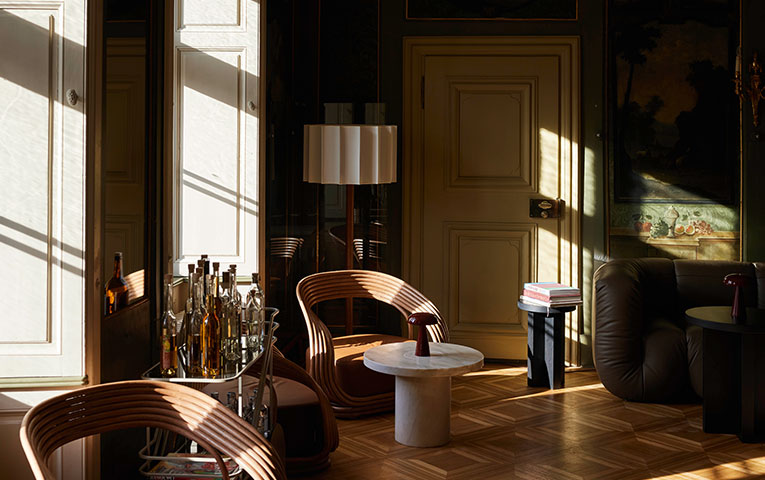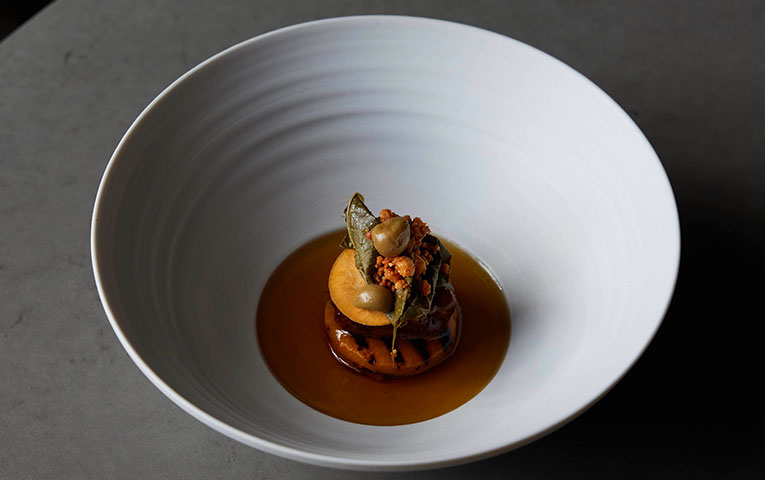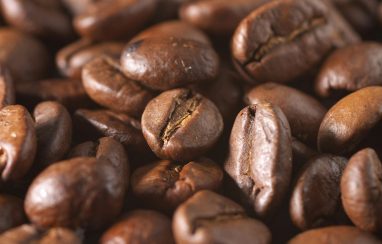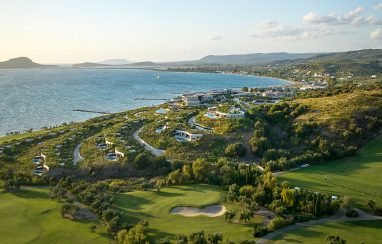By Paulina Björk Kapsalis
When Swiss culinary icon Andreas Caminada arrived at Mandarin Oriental, Costa Navarino to cook alongside chef Bertrand Valegeas for the destination’s Stirring Stars series, it was a fusion not just of flavors, but of philosophies. In many ways, Valegeas’ Costa Navarino and Caminada’s Schloss Schauenstein – a three-Michelin-starred castle restaurant nestled in the Swiss Alps – share more than a love for exceptional cuisine. Both destinations are deeply connected to their terroir and driven by a commitment to sustainability – whether it’s through reducing waste, elevating local producers, or preserving culinary traditions. For Caminada, this rootedness is the key to relevance in an ever-globalizing gastronomic world.
“I think the way we are rooted locally in small towns is our strength and point of difference. Without a strong home base, you cannot extend your mind or your business. And I believe that locally rooted stories also have their right to be globally relevant.”
Best known for turning the town of Fürstenau into a gastronome’s haven, with three restaurants now operating on the castle grounds, Caminada is also the founder of the Uccelin Foundation – nurturing the next generation of chefs to think beyond borders while never forgetting where they come from.
We spoke to Chef Caminada after the event to learn about his passion projects, discuss the parallels between a Swiss castle and a Greek riviera, and delve deeper into the culinary crossroad of our time: the growing focus on what’s local.

Tell us about the Stirring Stars event. How was it cooking with Chef Valegeas in The Private Kitchen?
It was absolutely fantastic! We’ve known each other for over 10 years, and it was a pleasure to be side by side in his kitchen. The atmosphere at this beautiful place was fantastic – I really enjoyed it.
Any dish that stood out on the night?
What stood out to me was how harmoniously the dishes came together and the overall the experience for the guests. But of course, I was especially happy to get a taste of Bertrand’s chocolate soufflé at the end.
What were your impressions of Costa Navarino?
I fell in love with the destination last year when I visited with my family. We admire this place – the calm, the endless possibilities, and the outstanding hotels.
The story of how you took over your castle, Schloss Schauenstein in Fürstenau, is inspiring. Would you take us back to that time? What were your expectations in those early years?
At age 26, deciding to open my own restaurant was a huge risk. But honestly, I was more focused on making guests happy and creating an exceptional atmosphere than on the risk itself. I didn’t have any grand expectations – just the goal of creating something special together with the team.
And now, the town known as the “smallest city in the world” is a gastronomic hotspot with three Michelin-awarded restaurants and an annual gourmet market. How important is social sustainability and bringing back to the community to you?
I believe social sustainability is absolutely central. It’s a key element of giving back to society. We need to support our talents and create an atmosphere where they feel valued and can continue to grow.
Do you identify with Mandarin Oriental and Costa Navarino’s efforts to honor the culinary heritage of Messinia?
Absolutely! Bertrand gave me a tour of the garden, and for me, projects like that are an integral part of celebrating local heritage. They also offer room to grow – not just in the size of the garden, but in the team’s knowledge and engagement with the region.

Is independence from supply chains possible in fine dining?
Yes, it is. But it requires tremendous effort, patience, and the right partnerships. You need to work with people who share your values and vision.
Tell us about the Uccelin Foundation.
I was lucky enough to do an exchange year in Canada in my teenage years, and my host dad arranged two days in Vancouver so I could explore the city’s best restaurants. I had already completed my apprenticeship, and watching those chefs at work gave me a huge boost of inspiration and motivation.
Ten years ago, my wife Sarah and I founded the Fundaziun Uccelin – the Uccelin Foundation – to offer participants the opportunity to train in the world’s best restaurants and work alongside exceptional producers, connecting incredible places with hungry talents. For us, this is an absolute passion project.
Every year, we award 20 scholarships to talented young chefs and service professionals, whom we push to learn as much as possible within five months. They start their journey in Fürstenau and train at the castle before heading off to several of our 70 partner restaurants and 40 partner producers. Afterward, they return to Fürstenau and work on their final project – a product that can be sold to generate funds for the foundation. To date, over 90 young chefs have completed the five-month training program, and we have raised nearly 1.5 million euros.
The Caminada Group employs hundreds of people today, and you even have your own magazine. Are you still a chef first?
Absolutely! I became an entrepreneur the moment I opened Schloss Schauenstein in 2003, so cooking and working on the business have always gone hand in hand. I started with four
employees; now we are proud to have around 150. But it’s never been about the size of the group or the number of restaurants or stars. My passion – and the driving force behind everything – is food. I love being a chef, a mentor, and an entrepreneur. Creating dishes at the castle with my head chef Marcel Skibba will always be a top priority.
One of the things that stands out to guests at Schloss Schauenstein is the warm atmosphere. How does the setting influence the dining experience?
I believe the setting is a big part of it. The design, the history of the place, the hospitality, and the people who shape the environment – all of that creates the castle experience.
How has your culinary style evolved over the years?
I think the entire world and our society have changed. In my kitchen, I feel like we evolve every six months or so, especially with an increasing focus on local sourcing. But the way we cook, with great respect for the product and curiosity, remains the same.
Where do you see fine dining heading in the next decade?
I wanted Schloss Schauenstein to be a place that is approachable for guests, and I think that fine dining in general is moving in that direction. Guests should feel at home, and I think, more and more, chefs and hosts are prioritizing that.
Finally, we know from your dining concept at Igniv that you love sharing. Do you enjoy Greek meze?
Of course! Though I have to admit, the first thing I ate when I arrived was a Greek salad.
Anything you had to eat in Messinia worth sharing?
Quite a few things! The stuffed wine leaves – dolmadakia – were excellent, as well as the many refreshing dips and sauces! But more than any single dish, it was the overall spirit of the place that simply makes one happy. It nurtures the wanderlust – you arrive here and experience Greece with all your senses!

